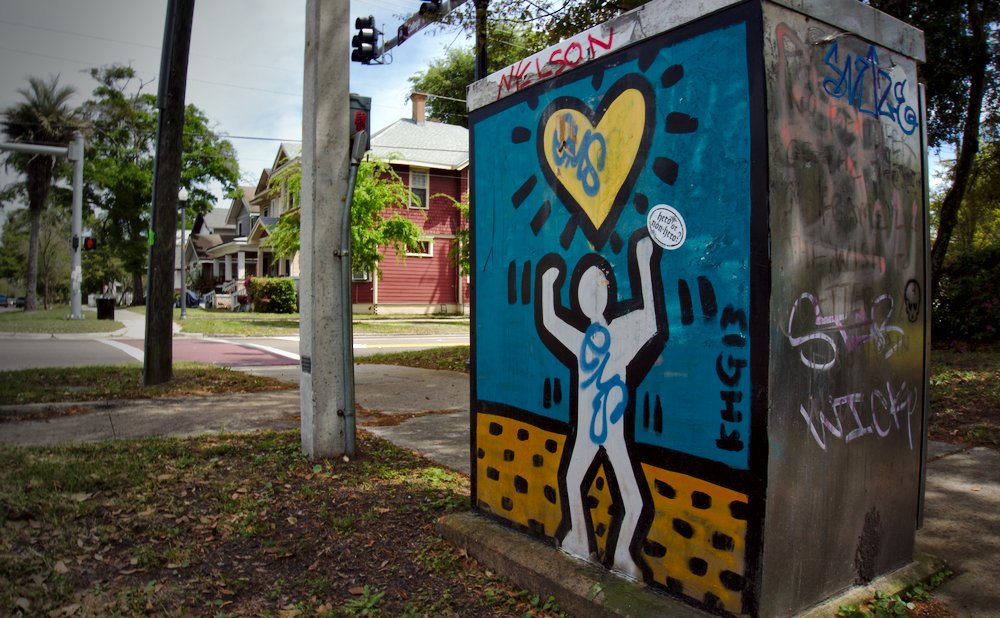 By Matt Keene | gargoyle@flagler.edu
By Matt Keene | gargoyle@flagler.edu
Jacksonville-based graffiti artist Keith Haring’s Ghost was unmasked and arrested on Tuesday, March 18. Ghost has become known in recent months for illegally painting social and political messages on utility boxes throughout Jacksonville. He adopted the moniker of Keith Haring’s Ghost as tribute to the late Keith Haring, an artist who dealt with issues of love, race and gay rights.
Ghost used anonymity to protect his family, his identity and to keep the spotlight firmly pointed on the messages of his artwork and not on himself. This artwork particularly challenged viewers to examine gun rights and race relations in Northeast Florida.
I had the opportunity to interview Ghost one month ago, prior to his arrest. In respect of his intentions, his real identity will not be disclosed. A cursory search of local news can provide that information.
The following are pieces from my interview with Ghost.
Keene: Tell me a little about your art.
KHG: At its very root, it is language of sorts. It is, essentially, the rawest language that you have. My artwork is either pieces of Keith Haring’s art or derivitaves of it. Haring made this art for public consumption. Twenty three years after his death, there’s very little Keith Haring art left on the streets, though. Most of it has been hoarded away into wealthy people’s collections.
Keene: Why now?
KHG: It seemed like a good time. Jacksonville is going through some changes. The city refuses to move forward in its ways. I had looked at a few different ways to make an impact on the city. The first piece I did was a Trayvon Martin piece. After Jordan Davis was killed, I talked to Davis’ parents and they loved the idea. The piece starts with the idolatry of money and capitalism and how that leads to a loss of morals. That people are then driven by hate rather than love and start putting all this faith into weapons. It’s f*cking crazy how the Stand Your Ground law is being applied. It’s a bizarre state of affairs in this country, in Jacksonville as much as anywhere. It’s amazing we can’t move past this. There’s a culture of division. The climate isn’t getting any safer or better with this law. It certainly isn’t safer for black people.
Keene: Do you feel hopeful for change?
KHG: Absolutely. I’m a Christian, but when I read the Bible I don’t get this big hateful thing. I get this message of absolute love and acceptance of humanity, especially the least of humanity. But America isn’t doing that. We aren’t taking care of hungry people, sick people, homeless people. We’re only taking care of the families in the top.
Keene: What role do you think the artist has in society?
KHG: I think it’s a powerful role. It’s one that carries a lot of responsibility. If you have the ability to make people think, that in and of itself is kind of hard.
My role in all of this isn’t me painting these paintings, though. It’s how we did it, where we did it and when we did it. I use an elaborate network of lookouts at very political, opportune times. In a gallery, maybe 3,000 people will come, but some of these pieces have traffic impressions into the millions. That’s more powerful than anything I could ever do in a gallery.
Keene: Anything else you’d like to add?
KHG: The people in the minority have to be stood up for by the people in the majority. That’s the good fight. I’d like to talk about equality. All human beings, whether they’re black, white, yellow or blue, whether they love men or women, it doesn’t matter. If they’re human beings, they’re human beings. They should be treated with the exact same dignity and respect.




Be the first to comment on "Jacksonville artist Keith Haring’s Ghost talks race relations, gun rights"